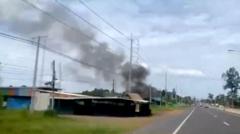The tension-filled situation along the Thailand-Cambodia border erupted into violence recently, culminating in a tragic confrontation that has heightened fears of war. Following a series of encounters that began in July, at least 12 Thai civilians have been reported dead as a result of clashes, with the Cambodian toll still unclear. The escalation stems from an age-old dispute over territory that dates back over a century to the colonial era, making this latest bout part of a more extensive and fraught history between the two Southeast Asian nations.
The roots of hostility intensified in 2008 when Cambodia sought to classify an ancient temple located in the contested area as a UNESCO World Heritage site—a move that provoked strong backlash from Thailand. Since then, sporadic armed skirmishes have occurred, claiming lives on both sides. Recent tensions rose sharply in May after a Cambodian soldier's death in a prior engagement, marking a significant low in diplomatic relations.
The conflict's latest instance occurred under contentious circumstances, with both nations offering conflicting accounts of the events leading to the clashes. Thailand's National Security Council described a scenario where Cambodian forces utilized drones for surveillance followed by an aggressive engagement from Cambodian troops, while Cambodia accused Thai soldiers of violating peace agreements, asserting their troops had acted in self-defense after being provoked.
Current leadership from both countries expresses a desire to address the situation delicately, emphasizing the need for diplomacy to prevent further escalation. Thailand's acting premier recognized the complexities involved, while Cambodian Prime Minister Hun Manet asserted the importance of maintaining national sovereignty.
For those considering travel to the region, the situation remains localized, and no widespread travel bans have been enacted. However, travelers have been advised to exercise caution near the border area and popular tourist sites, reflecting the region's fragile and tense atmosphere.
The unfolding events demonstrate a precarious balance in the relationship between Thailand and Cambodia, with the potential for further conflicts if diplomatic measures are not prioritized amidst rising arms. The international community watches closely, hoping for de-escalation and a return to dialogue over one of Southeast Asia's most enduring territorial disputes.
The roots of hostility intensified in 2008 when Cambodia sought to classify an ancient temple located in the contested area as a UNESCO World Heritage site—a move that provoked strong backlash from Thailand. Since then, sporadic armed skirmishes have occurred, claiming lives on both sides. Recent tensions rose sharply in May after a Cambodian soldier's death in a prior engagement, marking a significant low in diplomatic relations.
The conflict's latest instance occurred under contentious circumstances, with both nations offering conflicting accounts of the events leading to the clashes. Thailand's National Security Council described a scenario where Cambodian forces utilized drones for surveillance followed by an aggressive engagement from Cambodian troops, while Cambodia accused Thai soldiers of violating peace agreements, asserting their troops had acted in self-defense after being provoked.
Current leadership from both countries expresses a desire to address the situation delicately, emphasizing the need for diplomacy to prevent further escalation. Thailand's acting premier recognized the complexities involved, while Cambodian Prime Minister Hun Manet asserted the importance of maintaining national sovereignty.
For those considering travel to the region, the situation remains localized, and no widespread travel bans have been enacted. However, travelers have been advised to exercise caution near the border area and popular tourist sites, reflecting the region's fragile and tense atmosphere.
The unfolding events demonstrate a precarious balance in the relationship between Thailand and Cambodia, with the potential for further conflicts if diplomatic measures are not prioritized amidst rising arms. The international community watches closely, hoping for de-escalation and a return to dialogue over one of Southeast Asia's most enduring territorial disputes.



















